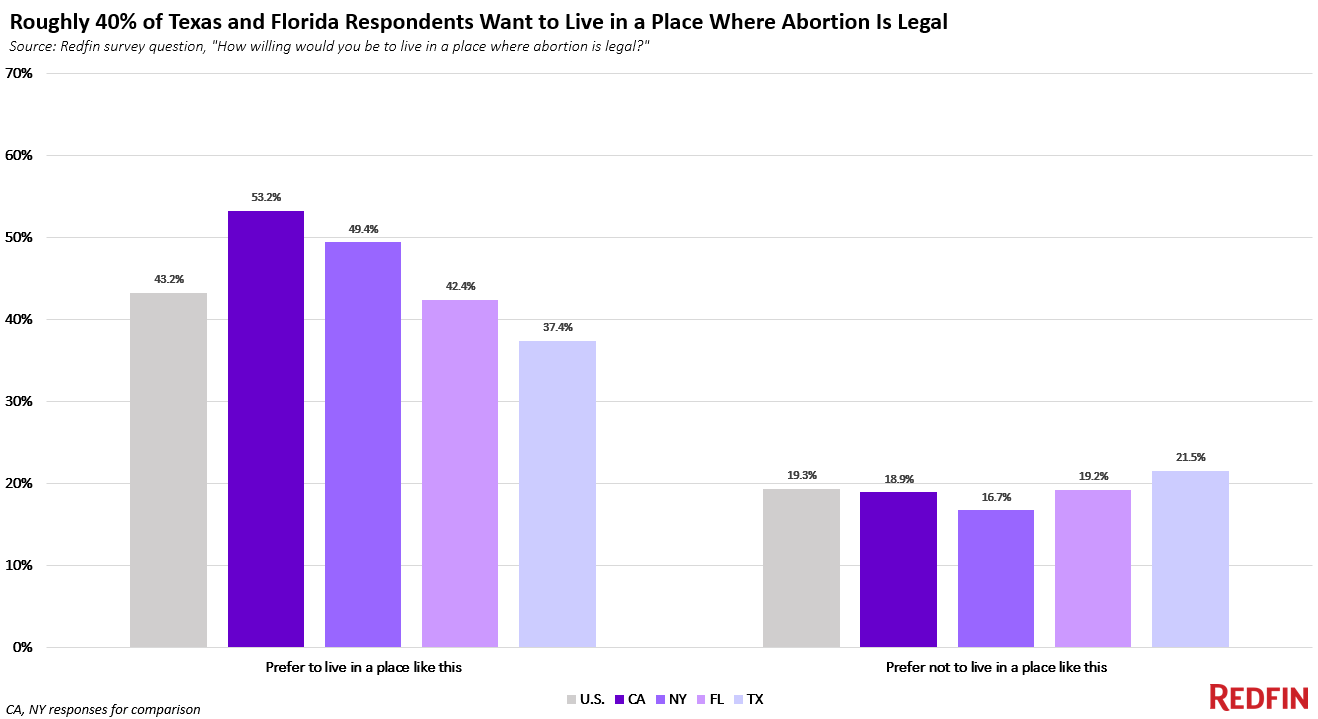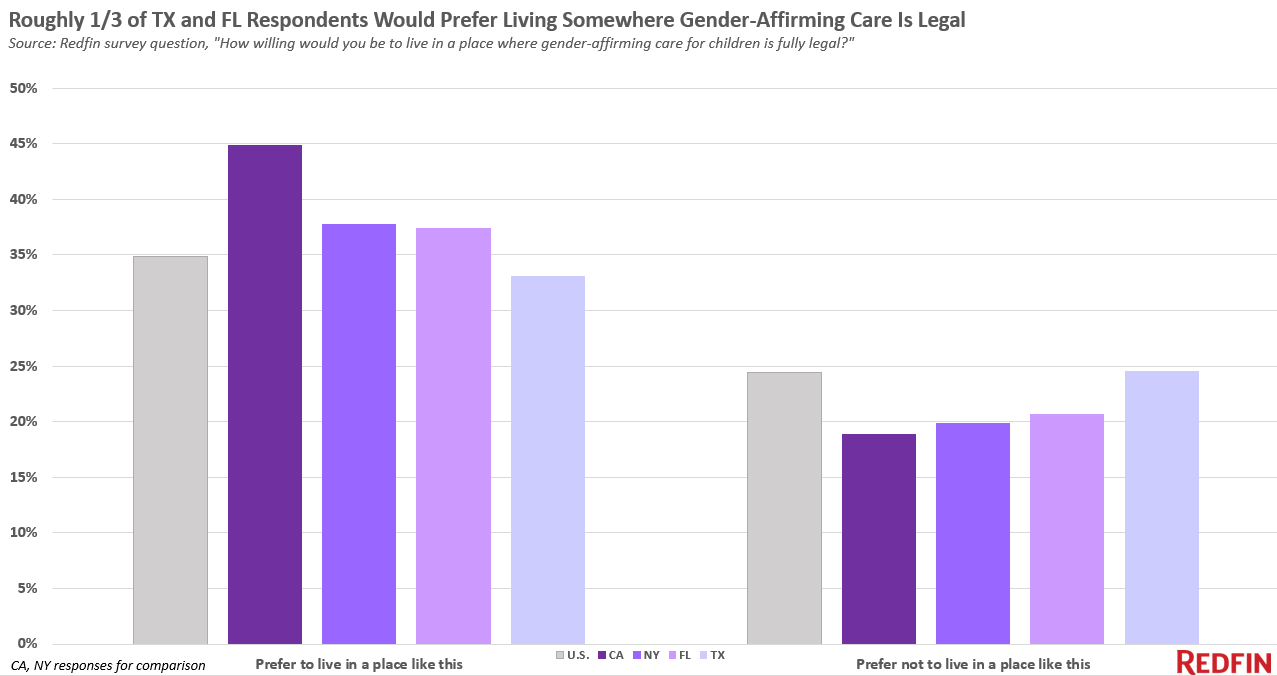Texas and Florida survey respondents are twice as likely to cite affordability as a factor in choosing where to live than alignment on social issues, which helps explain why so many people live in a place that’s out of sync with their views on abortion. Both states have been magnets for relocating homebuyers for the last several years, largely due to their relatively affordable housing.
Roughly two of every five respondents to a recent Redfin survey who live in Texas or Florida would prefer to live in a place where abortion is legal. That’s double the share who would prefer not to live in a place where abortion is legal.
The results from Texas and Florida, where abortion is either banned or in the process of being banned, are similar to results from the country as a whole. Like Florida and Texas residents, about two of every five respondents from the U.S. overall would prefer to live in a place where abortion is legal, roughly double the share who would prefer not to.

This is according to a Redfin-commissioned survey conducted by Qualtrics in May and June 2023. The survey was fielded to 5,079 U.S. residents who either moved in the last year, plan to move in the next year, or rent their home. This report focuses on the 396 respondents who indicated they live in Florida and the 414 in Texas, plus the 419 in California and 336 in New York for comparison. See the bottom of this report for more details on the survey, including each answer choice.
In Texas, abortions beyond six weeks of pregnancy have been banned since 2021. All abortions in Texas other than those to protect the mother’s life have been banned since the Supreme Court overturned Roe v. Wade, doing away with the federal right to abortion, in June 2022. In Florida, Gov. Ron DeSantis approved a bill that would prevent abortions after six weeks of pregnancy, but it’s in legal limbo until the conservative-leaning Florida Supreme Court hears a case on it.
Florida and Texas respondents are more likely to cite affordability than social views as a factor in choosing where to live
The contradiction between the type of place Florida and Texas respondents say they would prefer to live and where they actually live suggests that for many people, other factors outweigh social preferences in choosing where to reside.
Just over 1 in 10 Florida (13%) and Texas (12%) respondents who recently relocated said living in an area better aligned with their views on social issues factored into their move. Affordability was a more common reason, with more than 20% of Florida and Texas respondents citing a lower cost of living. Other reasons more commonly cited than alignment on social issues include a desire for more space and being closer to family. The results are similar for the U.S. as a whole.
“Deciding where to live is a compromise, and the housing affordability crisis in many parts of the country means many homebuyers must compromise certain preferences for affordability,” said Redfin Chief Economist Daryl Fairweather. “Even though many parts of Florida and Texas have attracted an influx of migrants who have pushed up prices over the last few years, homes there are far less expensive than a coastal city. A person who identifies with the local policies of a place like Seattle or San Francisco may live in a place like Dallas simply because it’s what they can afford.”
“Still, people often self-sort into areas where their neighbors have similar social and political views,” Fairweather continued. “Liberal people who live in Texas or Florida may choose a home in a neighborhood where they see flags that speak to their beliefs, for example.”
Homebuyers who are moving from one part of the country to another tend to flock from expensive coastal cities to relatively affordable metro areas, a trend that has been going strong for years but intensified during the pandemic because of record-low mortgage rates and remote work. Five of the 10 most popular destinations for Redfin.com users who are moving from one metro to another are in Florida, and two are in Texas. Overall, Florida and Texas gained more new residents than any other states in 2022.
Homes in Florida and Texas tend to be much less expensive than the common origins of people moving in. The typical home in Miami, for instance, sells for $515,000, compared with $705,000 in New York, the most common origin of movers to Miami. In Dallas, the typical home sells for $443,000, roughly half the price of Los Angeles, the most common origin for homebuyers moving to Dallas.
Even before the pandemic, Florida and Texas were popular destinations; they gained more new residents than any other state in both 2018 and 2019. For the many Americans who moved to those states before the Supreme Court overturned Roe v. Wade in mid-2022, abortion policies have since changed.
“For some people who moved to a place like Tampa or Dallas in 2019 or 2020 to get a more affordable home, a part of them may now wish they lived somewhere that aligns better with their views on abortion, since its legality is now in the hands of each individual state,” Fairweather said. “But it’s not that simple. They probably still appreciate the relatively low cost of living, and may not be able to afford to move to a different state. Beyond finances, many are entrenched in their jobs, their kids’ school and their communities, and those things make it hard to leave.
Florida and Texas respondents more likely to prefer living somewhere with protections for LGBTQ children than without them
Roughly one-third of Florida (37%) and Texas (33%) respondents would prefer to live in a place where gender-affirming care for children is legal, according to the same Redfin survey. That’s significantly higher than the 21% of Florida respondents and 25% of Texas respondents who would prefer not to live in such a place. Gender-affirming care includes transition surgeries and hormone therapies, among other treatments.

The reality of the legal landscape differs from the preference of many Florida and Texas respondents. Gender-affirming care for transgender youth is illegal in Texas and Florida as of this year, though the latter’s rule is in limbo as it experiences legal challenges to its enforcement.
A similar share of Florida (36%) and Texas (35%) respondents would prefer to live in a place that has laws allowing discussion of LGBTQ topics in schools. That’s higher than the 25% and 28%, respectively, who would prefer not to live in such a place.

Discussion of sexual orientation and gender identity in school is banned via a so-called “Don’t Say Gay” bill in Florida, and a similar bill is making its way through Texas’ state government.
The results from Florida and Texas are comparable to the nation overall.
Methodology
This report is based on results from a Redfin-commissioned survey conducted by Qualtrics in May and June 2023. The survey was fielded to 5,079 U.S. residents who either moved in the last year or plan to move in the next year, or who rent their home. This report focuses on the 396 respondents who indicated they live in Florida, the 414 in Texas, the 419 in California and the 336 in New York.
The following question was posed to respondents: “Please indicate how willing you would be to live in a place where abortion is legal” and asked them to select either “I would only live in a place like this,” “I prefer to live in a place like this,” “Has no impact on where I would live,” “I prefer not to live in a place like this,” and “I would not live in a place like this.” In this report, we combined the “only live” and “prefer to live” responses, and combined the “would not” and “prefer not” responses.
We also asked respondents to indicate their willingness to live in a place where gender-affirming care for children is fully legal, and their willingness to live in a place that has laws allowing discussion of LGBTQ topics in school, on the same scale.

 United States
United States Canada
Canada